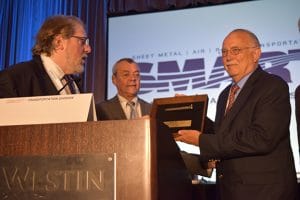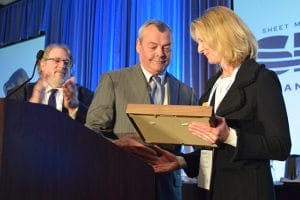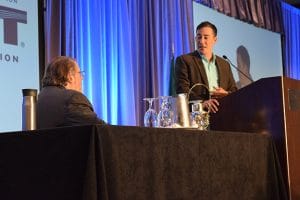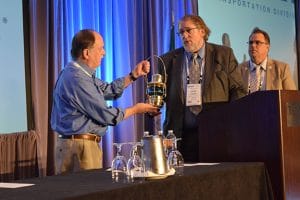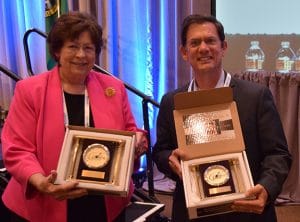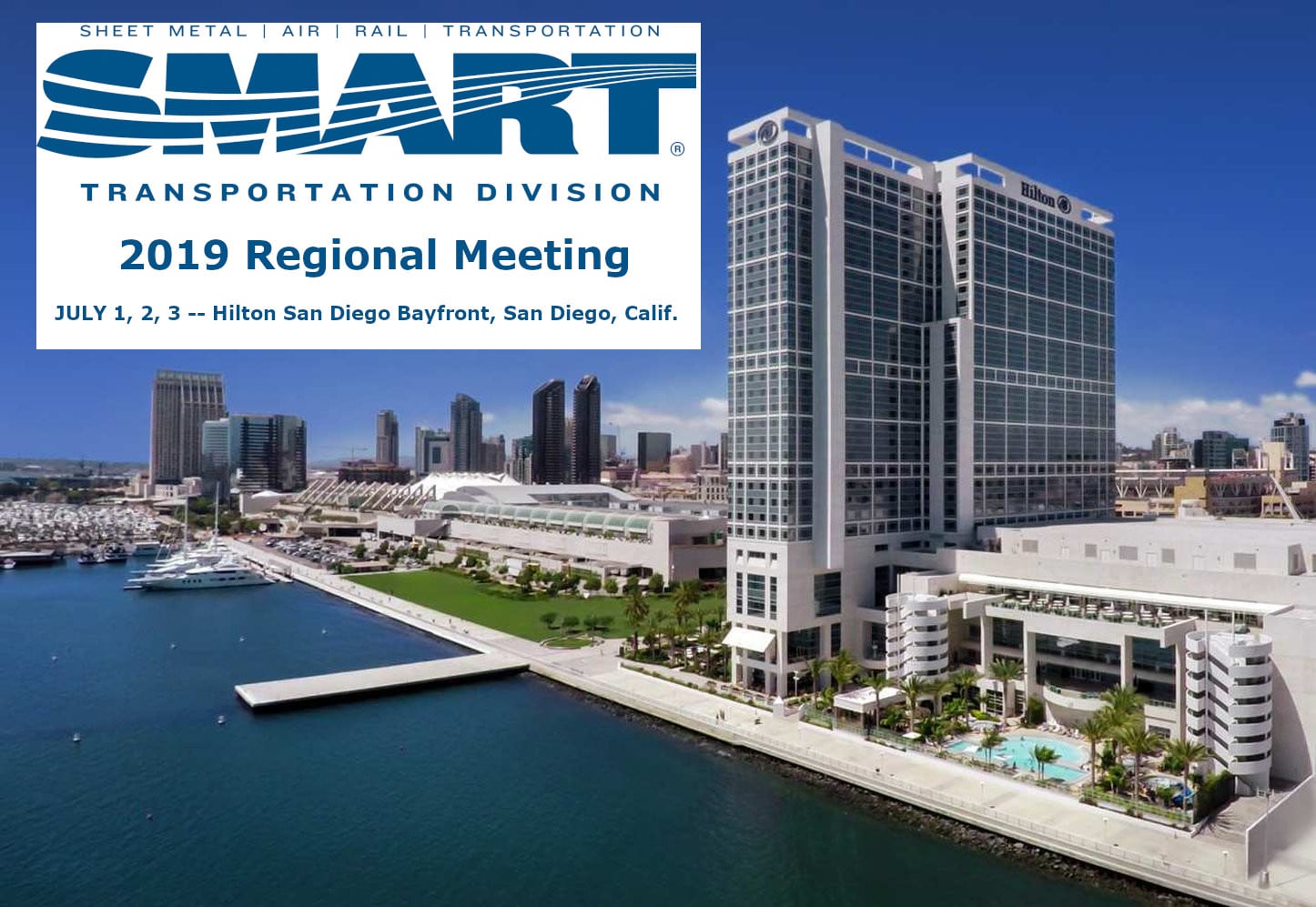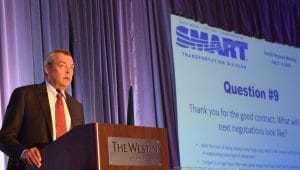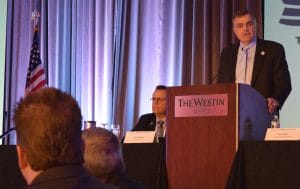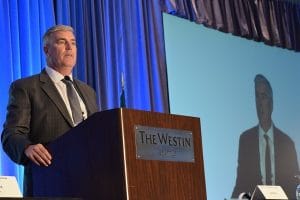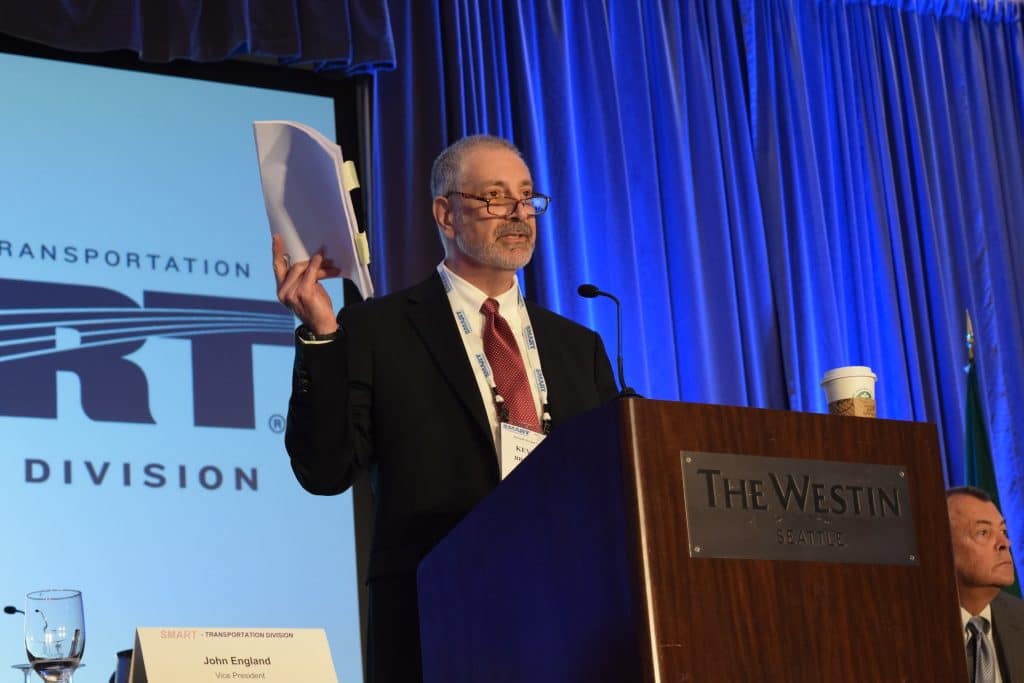U.S. Sen. Chris Van Hollen, a Maryland Democrat, introduced S.3215 on July 16, a companion bill to the Bus Operator and Pedestrian Protection Act.
In June, Congresswoman Grace F. Napolitano (D – Calif.) and Congressman John Katko (R — N.Y.) introduced the original bill, H.R.6016, that would enhance the safety of bus drivers nationwide.
“Ensuring a safe work environment for transit operators is crucial to improving our transportation system for both passengers and employees,” Van Hollen said. “This legislation makes a long overdue push to improve safety conditions for these men and women — and invests the resources to make it happen.”
Immediately upon the legislation’s introduction, SMART Transportation Division leaders announced their support for the bill, and they also support Van Hollen’s bill.
“There have been gruesome, inexcusable acts that have been committed on our bus members including shootings, stabbings and beatings, and little has been done about it. We need adequate driver shields and mandatory de-escalation training,” said National Legislative Director John Risch. “Our pledge is to continue to work with Congress and the administration to ensure all bus operators are given the protection they deserve.”
Countless news reports of incidents involving spitting, beatings and stabbings by unruly passengers have left SMART TD bus drivers as victims of frequent violence. A college student critically injured in a stabbing April 9 while he rode on a bus owned by Montebello Bus Lines (MBL), whose workers are represented by Local 1701, died in June of his injury.
“Every day we hear major news stories of bus drivers being beaten, having items thrown at them, spitted upon, and verbally abused. LA Metro, for instance, which operates in my district experiences approximately 130 assaults on bus drivers per year,” Napolitano said in a news release. “This is an unthinkable experience for drivers, and it also has major safety impacts on passengers, motorists and pedestrians, as these assaults often occur while the bus is moving.”
Both the House and Senate legislation require transit agencies to develop Bus Operations Safety Risk Reduction Programs by implementing physical barriers to prevent operator assaults, de-escalation training for bus drivers, driver-assisted technology to reduce accidents and modified bus specifications or retrofits to reduce visibility impairments.
“There is no higher priority than operator safety. On a daily basis, we see reports of drivers getting assaulted and having their lives irreversibly changed because they were behind the controls just doing their jobs,” said SMART TD Bus Department Vice President Calvin Studivant. “This critical legislation will significantly improve bus driver safety through risk reduction programs and other safety requirements.”
The Bus Operator and Pedestrian Protection Act and its Senate companion bill continue to build on SMART TD’s efforts to protect bus drivers and eliminate operator assaults, but the effort of members is needed to get political leaders to support the legislation via the Legislative Action Center.
H.R. 6016 as of July 24 had 36 cosponsors — two Republicans and 34 Democrats. It has been referred to the Subcommittee on Highways and Transit.
S.3215 has been referred to the Senate’s Committee on Banking, Housing, and Urban Affairs and co-sponsors are being sought.
Author: bnagy
A pair of tours on August 5 and 6 for attendees of the 2018 SMART Transportation Division Regional Meeting in Hollywood, Fla. has been finalized.
Day 1 (August 5): Florida Everglades excursion

Day 2 (August 6): Water tour of the ‘Venice of America’ on the Intracoastal Waterway
A leisurely three-hour cruise held Monday, August 6, will provide our group with the opportunity to see the waterways, beautiful homes of the rich and famous, as well as some of their amazing yachts! Attendees will simply walk outside the Diplomat Resort and cross the walkway that takes you over the road to the Intracoastal Waterway, where a private chartered water taxi will be docked and waiting.
Attendees will be picked up at 10 a.m. at the Intracoastal Waterway, and the water taxi will return to the hotel by 1:30 p.m. A catered lunch will be provided aboard the ship, which has a restroom and numerous covered observation areas.
Tour costs are $35 per person for registered guests of the regional meeting and $75 per person for guests who are not registered for the regional meeting. Follow this link to register online or you can download a fillable PDF version of the regional meeting registration form.
NEWARK, N.J. — Jennifer “Cookie” Doyle reports that SMART Transportation Local 60 will hold a “Railmen for Children” charity bike run July 28. Registration begins at 10 a.m. and goes until 11 a.m., when motorcycle riders will start the run.
The cost of this event is a donation of $20 per person. The ride begins and ends at the Tramontin Harley-Davidson, 482 Hope Blairstown Road, Hope, NJ 07844. Riders will be fully escorted by the Blue Knights NJ8. Food and a live band will be provided after the ride concludes.
All members and locals of SMART are welcome to attend. All signups will be done the day of the event. For questions, contact Doyle at 973-219-2968.
Event T-shirts are available in red, blue, orange and tan for $15 each. See James Tufano or Richie Fryer in Hoboken or email rfcrm16@gmail.com and include your name address size and color.
Established by New Jersey Transit conductors and engineers, Railmen for Children brings joy and laughter to more than 300 special needs children each year via the “Santa Claus Express.”
All proceeds from the bike run goes to support the Santa Claus Express.
On Aug. 30 from 10 a.m. to 4 p.m., the Federal Railroad Administration will host a seminar on drug testing policy and rail safety in Kansas City, Mo.
The seminar dives into 2017 drug testing amendments and a pair of amendments to safety rules created in November 2014 and December 2017. It will be held at the National Weather Service Training Center Auditorium, 37220 NW 101st, Kansas City, MO 64153. A government-issued ID is required to enter the building. There is no charge to attend.
To register, visit https://www.fra.dot.gov/conference/2018/reoseminar/register.aspx.
SEATTLE — SMART Transportation Division’s Washington State Legislative Board, represented by Legislative Director Herb Krohn, gave awards to a number of state legislators supportive of the union’s safety efforts at July’s regional meeting.
Receiving Golden Spike Awards for “exemplary leadership in advocating for legislation to protect the safety of both railroad workers and the general public” were state Sens. Steve Conway (D – Dist. 29) and Patty Kuderer (D – Dist. 48).
When receiving his award, Conway talked about the need for multiple-person crews on trains and the vital support crewmembers provide to first responders when a rail accident happens.
“We’re going to get that bill,” Conway said. “We’re going to get it passed.”
Kuderer, an attorney who worked on a number of railroad-related cases, is a “magnificent advocate” for rail safety, Krohn said, and had a hand in the state hearings regarding the aftermaths of both the 1993 Kelso accident and the 2015 Stampede Pass incident in which a train came apart during a blizzard.
In her speech accepting the award, Kuderer talked about how her grandfather, a union railroader, and later her grandmother could stay in their home after retirement thanks to a pension that unions fought for and protected.
However, the recent Janus v. AFSCME decision places those things in jeopardy.
“There’s direct evidence that unions work and they’re not the problem,” Kuderer said. “I think what we need to do is to fight fire with fire. The Freedom Foundation is not going to give up. The Koch brothers aren’t going to give up. Big money interests, they’re not going to give up. But we have something more than they have – we have numbers, we have people, and we need to communicate the message of the unions more effectively to people to make them understand why it’s important to be a part of it.
“Just know that here in Washington, we’re going to do what we can to continue to protect unions and working families,” she said.
State Sen. Steve Hobbs (D – Dist. 44) received the Washington State Legislative Board’s 2018 Senator of the Year award for support of rail labor and working to lead the state’s Transportation Committee.
“If you don’t remember about the people – the people that drive the buses, the people that are on the rail cars, the people that fly the planes – then you’ve missed the point about transportation,” Hobbs said. “Because transportation is not just about getting people from Point A to Point B or getting your product from Point A to Point B, it’s about connecting people, building relationships.”
State Rep. Mike Sells (D – Dist. 38) was given a Golden Lantern award as the 2018 Representative of the Year. Sells leads the Washington State House Labor and Workplace Standards Committee and has sponsored or co-sponsored “every piece of legislation that we’ve introduced on rail safety,” Krohn said.
Three state senators also were recognized for their advocacy and full support of TD legislation.
State Sens. Marilyn Chase (D – Dist. 32), Mark Miloscia (R – Dist. 30) and Hans Zeiger (D – Dist. 25) all were given awards for voting for 100 percent of TD safety legislation and for their 100% sponsorship or co-sponsorship records for all TD-supported legislation over the past six years.
In addition to Krohn, Assistant State Legislative Director Steve Mazulo of Local 855 and Darren Volland, legislative representative of Local 426, served as the host local committee for the meeting at the Westin hotel in Seattle.
SEATTLE — SMART Transportation Division President John Previsich announced July 4, on the final day of the TD Regional Meeting in Seattle, the location of the 2019 regional meeting.
The Hilton San Diego Bayfront in San Diego, host to the 2014 SMART TD convention, will host SMART TD’s regional meeting from July 1 – 3, 2019.
The meeting in San Diego will be the lone regional meeting next year because it is a convention year.

